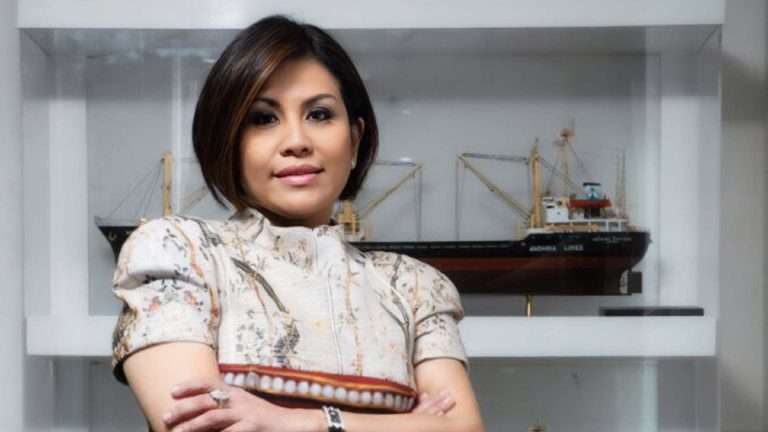Indonesia Shipping Refashioned
A sultry lady and a well-known figure in the Indonesian shipping industry and local glitterati circles, Carmelita Hartoto is the epitome and feminine face of modern Indonesian shipping. Goh Tz’en Long files this story.
Carmelita Hartoto cuts a fine figure and holds the dual distinction of being both the incumbent President of INSA (Indonesian National Shipowners’ Association) and President Director and CEO of Andhika Lines.
She is reputed to possess a warm and effusive personality, one that belies her strong skills at the negotiation table and uncanny business instincts.

Carmelita, who believes in professionalism and strong family values, and runs a family business in the shipping industry, readily acknowledges that her parents have been instrumental to her life and career and have been a great influence.
Despite a demanding schedule and punishing routines, Carmelita manages to find time for her personal life and yet be able to manage association activities, to which she is deeply committed, and heavily involved in.
“These are classic questions to a career woman. Like other career women, I always try to find quality time for gathering with my family, of which I could manage a balance between personal life, business and participate in association. Moreover, I hired some professionals to manage my shipping business…”, says Carmelita.
Carmelita leads a fine and eclectic life and has varied personal interests and hobbies. “I am interested in social life, travelling and enjoy culinary flavours and epicurean delights.”
The lady has a burning passion to do more for the shipping industry. She adds: “Well, I always dream that Indonesian shipping will be returned to its’ glory time in 1980, where we may find Indonesian flags in many parts of the world.”
On the effect that recent developments such as the Covid-19 pandemic has had on the shipping industry. Carmelita agrees that Covid 19 has impacted the livelihoods in the shipping industry.
“In the first and early stages, cargo and passenger throughput fell significantly. And up till now, the numbers of travellers have been reduced significantly due to social distancing. Seafarers as front liners live in danger. The IMO has categorised Maritime workers as important persons. Therefore our Government designated some main ports as legal and safe ports for repatriation and crew change with a safe health protocol…”
When asked, whether digitalisation and technology can play a role in alleviating the pressure points, Carmelita has this to say: “Some parts yes, digitalisation and the role of technology may solve some problems like working from home, online shopping etc. But other sectors could not be touched by digitalisation. Repair, maintenance of ships still needs a personal feel, although the presence of supervisors may be reduced.”
On the topic of what Indonesia can do to reduce its carbon footprint within the maritime sector and how it can work towards achieving net neutrality and carbon zero by 2030 or 2050: “As a member of IMO, Indonesia has to ratify IMO regulation, All though, operational costs will increase. But always subject to the availability of fuel supplies. Of which we rely towards Pertamina State owned enterprises.”
Carmelita holds the affirmative and unapologetic view that cabotage should continue. Cabotage is not just only to regulate that the cargo traffic within Indonesia should be carried by Indonesian vessels. But cabotage is also the sovereignty of the country. She says, “Indonesia is as wide an archipelago as it is a country. We should safeguard sovereignty in economy and sovereignty in security. Who will protect our country against disaster or war? It should be Indonesian flagged vessels.”
Asked about the value of foreign investments and the role played by investors in the marine sector, Carmelita shares the following insight: “Actually, foreign investments in the marine sector does not make benefits for Indonesian people as compared to manufacturers. The investment is only on the ship, which may be deployed at anytime whenever the investor wants it. However, for higher technology vessels that are not yet available in Indonesia, there are opportunities for foreign investors to cooperate with Indonesians with the maximum share of 49%.”
Carmelita acknowledges that opportunities exist in the offshore sector for foreign investors. However, clean energy and renewables might not be a solution for Indonesia, just yet.
She says, “For marine industry? I think it still too far to go there. There are thousands of ships running with conventional energy. We need longer time to modernise our fleets. The nearest and most achievable is bio solar as renewable energy.”
There are challenges to the shipping industry in the foreseeable future…
Carmelita sees low competitiveness against foreign shipping as one of the key challenges in the Indonesian shipping industry.
“Our Fiscal and Monetary policy doesn’t support the shipping Industry. We need policy equal to what another country [is doing] supporting their shipping industry… Soft loans and free tax policies.”

